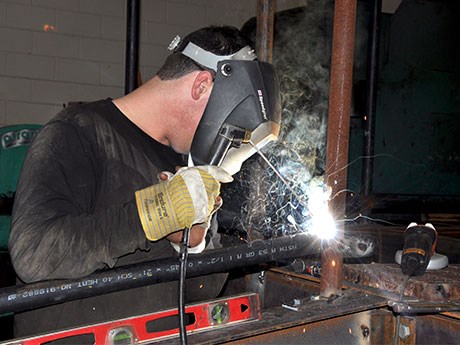College dean sees growing interest in skilled trades
Michel Barbeau, dean of skilled trades at Cambrian College in Sudbury, agrees there’s a shortage of fully certified skilled tradespeople, or journeymen, at this point in time, but is more confident about meeting industry’s needs down the road.
The cause of the current shortage of fully qualified tradespeople is largely historical, claims Barbeau. High schools abandoned their trades programs and “if you didn’t go to university but were good with your hands, people thought you weren’t smart enough.”
That’s not the case anymore, he insists. Students and their parents see the skilled trades as attractive “more so than ever because of supply and demand, the salaries they will be making once they graduate and all the media coverage about the shortage of skilled labour.”
Cambrian’s School of Skills Training graduates close to 500 students every year, and enrollment is growing.
The number of students in the mining engineering technician program has more than doubled this year and students are flocking to the industrial electrician, heavy-duty techniques, millwright, power engineering and welding programs.
For example, there are 120 students currently enrolled in the first year industrial electrician program and next year, the college is expecting 140 students. Enrollment in the first year of the college’s mining program in 2012 was 56. The year before it was 26.
“The trades are becoming a first choice for young people, not a fall-back,” said Barbeau. “Especially now with what’s going on with the Ring of Fire, there are so many opportunities. I tell my students that they’ll be well-positioned for a great career in two or three years.”
In order to qualify as fully certified tradespeople, Cambrian grads still have to put in all of the required apprenticeship hours under the supervision of journeymen and, “sometimes, that’s the glitch because with the shortage of skilled labour and the ratios (of journeymen to apprentices mandated by government), it’s hard to bring people through the pipeline.”
There are two ways high school students can enter the trades. They can sign up with a company as an apprentice and leave their employer for a series of eight-week blocks of classroom instruction at a community college, or they can opt for the co-op diploma apprenticeship route, or Skytech model as it’s called at Cambrian.
Students in the co-op diploma program spend two or three years in the college’s classrooms and shops with several paid co-op placements at various intervals.
Now available provincially, the co-op diploma apprenticeship model was developed by Cambrian in co-operation with Inco, Falconbridge and several other employers “15 to 18 years ago,” said Barbeau.
There are several problems with the traditional apprenticeship training model. Employers lose their apprentices during the eight-week blocks of classroom instruction, and apprentices would have to leave their homes and families and relocate while subsisting on employment insurance.
“In southern Ontario, because they have the mass, they were able to manage it, but in Northern Ontario, we have to do things differently because of our geography,” said Barbeau.
“The Ministry did a survey after we had been running our program for eight years and found an 85 per cent success rate for students completing their journeymen qualification. Typically, it’s 40 to 50 per cent, so Skytech works, and when the province got wind of that, they adopted the model.”
Another benefit of the program is that when students join an employer for a co-op placement, they already have some very high skills and are able to contribute more.
“The programs at Cambrian’s School of Skills Training are typically 50 per cent theory and 50 per cent practical,” noted Barbeau. “Students work on realistic projects in shops that are well equipped with industrial grade machinery.”
And the kids are smart, he said.
“If you came here to the college, you’d be thoroughly impressed with how brilliant our students are.
“When I meet with high school students, I tell them ‘don’t quit on your communication skills, computer skills or math, because you’ll use them all.’
“The problem is that many of our students coming from high school were disengaged. They’d study Ohm’s Law, for example, but wouldn’t know what it was for. We have a very different way of delivering curriculum where we reinforce theory with practical labs.
“Don’t ask (our students) to write a thesis on the philosophy of life, but ask them to write the starting procedures for a power plant in power engineering and they’ll write you a thesis.”



